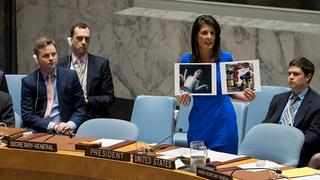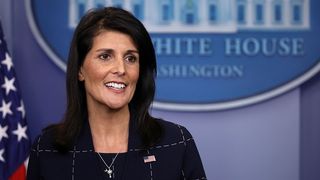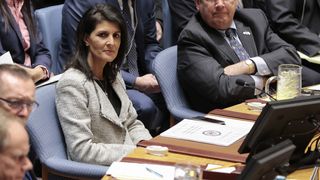As with much of this highly atypical presidency, the Trump administration’s United Nations (UN) policy is still taking shape. But for the past six months, Ambassador Nikki R. Haley has been a vocal presence at the United Nations and has had one of the higher public profiles among Trump’s foreign policy team.
How Haley fares will depend on her influence in a White House that remains deeply ideologically divided over America’s role in the world. President Trump came into office with scant regard for the United Nations and a general skepticism about multilateralism. But while he and some close advisers share a narrow “America First” conception of US global interests, other administration figures hold a more globalist outlook. On certain issues, including the importance of America’s global leadership1 and alliance networks, Haley is notably closer to the Republican mainstream than to Trump and the America firsters.
Although Haley is not at the epicentre of foreign policy formation and her public profile does not correspond to significant access to Trump, the United States’ UN policy could evolve under her stewardship to focus on parts of the organisation that the Trump administration finds useful to advancing US interests. The White House has already recognised the UN Security Council’s (UNSC) convening power during the ongoing North Korea crisis, while also aware of its limits. And on some UN issues — such as the response to Russia’s actions in Ukraine and Crimea — there has been a fair amount of continuity with the Obama administration’s approach. Still, amidst competing worldviews, unclear policy guidance, and an erratic president, it is too early to tell how the administration’s UN policy will unfold. Canberra should prepare to manage potential divergences with Washington over UN engagement — including on human rights now that Australia is joining the UN Human Rights Council in 2018 — and over the broader merits of the United Nations and multilateralism.
A surprise appointee
Nikki Haley was one of President-elect Trump’s first cabinet picks, before James Mattis for Defense or Rex Tillerson for State. Her nomination was to some extent a surprise. Not only had Haley been a critic of Trump during the primary campaign, but — in a significant break with tradition — she was a foreign policy novice.2 The Trump transition team instead prized her reputation as a dexterous and media-savvy governor with links to mainstream Republicans.3 Her experience managing South Carolina’s budget and bureaucracy, and negotiating with its legislature, was viewed particularly favourably as standing her in good stead to push for UN reform.4
While message discipline has not been a priority for President Trump, it appears Nikki Haley got too far ahead of the White House and State Department on some policy positions.
Before his inauguration, Trump labelled the United Nations as “a club for people to get together, talk and have a good time”.5 But he was not completely opposed to the organisation, and, notably, did not choose an ambassador who was ideologically at odds with its mandate. During her congressional testimony, Haley pointed to the United Nations’ successes, including its global health and food programs, and argued America’s interests would be better served by a reformed United Nations.6 Her appointment was something of a relief to many UN bureaucrats, diplomats, and US officials who believed that although Haley might shake up the organisation, she would not tear it down.7 While some diplomats were disconcerted by Haley’s public admonishments,8 in general they found her to be likeable and willing to negotiate if she could still achieve political wins.
In an apparent sign of her prominence, Haley was dual-hatted as ambassador to the United Nations and member of cabinet. Holding a cabinet position is unusual for Republican UN ambassadors — though not for Democrats — and it is notable that she negotiated this with Trump. She was also given a seat on the National Security Council’s (NSC) top decision-making body, the Principal’s Committee. Haley accordingly felt a fair amount of latitude to put forth strong policy positions that differ, at times, from those of the president. Indeed, her criticism of Russia was useful for the White House as evidence of a strong stance on this issue.9

Haley’s profile has risen quickly despite her steep foreign policy learning curve. She has spoken openly in UNSC debates and press briefings against Russia’s actions in Ukraine, Crimea, and Syria.10 In contrast to President Trump and Secretary Tillerson — who have made it clear that promoting human rights would inhibit the advancement of US security and economic interests — Haley has embraced the issue of human rights. She has spoken passionately on the plight of Syrian refugees and Venezuelan protesters, for example, and convened the first UNSC debate on human rights during the United States’ Security Council presidency in April.11 Haley also threatened to withdraw the United States from the UN Human Rights Council after criticising its membership and anti-Israel stance. Humanitarian assistance became a focus for Haley as she visited Syrian refugee camps in Jordan and Turkey, and discussed combating famine (including in Yemen and Somalia) with Ivanka Trump. On these issues, Haley has adopted a front-footed media posture which appears all the more prominent in light of Tillerson’s more reticent approach. Many even presumed she had sights on higher office and was cultivating an audience beyond UN issues.12
Yet an outsized public image and some policy latitude do not necessarily equate to access and influence. While message discipline has not been a priority for President Trump, it appears Haley got too far ahead of the White House and State Department on some policy positions.13 Both have since made it clear she should more closely follow State Department guidance (when it exists), and seek approval for comments on high-profile issues such as North Korea and Syria. Moreover, Secretary Tillerson appears to have significantly more access to and influence with Trump than Haley. She is nonetheless in a reasonably good position to shape aspects of UN policy.
Policymaking in the Trump administration
A key determinant of Ambassador Haley’s influence — and the White House’s UN policy overall — will be the shifting balance of power between different ideological camps within the administration. Haley is closer to the Republican mainstream than many of Trump's advisers. She has a far more internationalist outlook than Steve Bannon, Stephen Miller and other America firsters, whose views lay behind Trump’s withdrawal from the Paris climate agreement and Trans-Pacific Partnership. Like Defense Secretary Mattis and National Security Advisor H.R. McMaster, Haley has stressed the strategic value of alliances and global engagement and expressed skepticism about Russia. Still, her focus on issues such as human rights and humanitarian assistance, combined with her use of the media and the UNSC’s bully pulpit, make her appear more of a standalone figure from the rest of Trump’s foreign policy team.
Haley has a far more internationalist outlook than Steve Bannon, Stephen Miller and other America firsters, whose views lay behind Trump’s withdrawal from the Paris climate agreement and Trans-Pacific Partnership.
A problematic national security policymaking process may have added to Haley’s profile as a more individual voice in the administration. For the first few months of the new administration, for example, the US Mission to the United Nations in New York, where Haley is based, appeared to operate largely independently of the State Department,14 with reporting lines apparently running through the NSC instead.15 While McMaster has sought to make interagency coordination between different parts of the foreign policy bureaucracy more orderly, it has been vulnerable to competing worldviews and Trump’s impulsiveness (though this might improve somewhat with new White House Chief of Staff John Kelly).16 These bureaucratic failings are compounded by a slew of unfilled positions in the national security apparatus. Self-inflicted scandal and the president’s message indiscipline have also slowed the policymaking process. As a result, notwithstanding some dramatic policy U-turns such as on trade and climate, there has thus far been a fair degree of continuity with the Obama administration’s foreign policy, including at the United Nations.17
Furthermore, the State Department itself is a low priority for the administration. It is the target of proposed budget reduction of approximately 30 per cent and remains denuded of critical personnel.18 Tillerson has prioritised other issues ahead of UN policy and he does not expect to make new personnel appointments until 2018, after his strategic review of State and its mission is complete.19 This has contributed to the lack of policy coordination between Ambassador Haley and the department on certain issues, such as human rights and Syria.20 The White House and State have sought to address this by adding a degree of oversight of Haley, though there are ongoing differences over UN priorities, including for the UN General Assembly in September.21
Haley and America’s UN policy
Ambassador Haley’s efforts at the United Nations defy easy classification. She has differed from Trump on a number of issues central to the United Nations’ functioning and core mandate, including human rights and humanitarian relief.22 On some issues where initial White House or State Department guidance was lacking — like Russia’s actions in Crimea and Ukraine — she has continued similar policies to the Obama administration.23 But on other issues, Haley has embraced positions squarely in line with the views of the president, not least in her strong pro-Israel stance and focus on addressing what she deems to be the United Nations’ anti-Israel bias.
Haley appears to have helped elevate the United Nations’ profile with the president to a small extent and has possibly moderated his UN skepticism slightly. It is notable Trump met with UN Secretary General Antonio Guterres and, separately, with the 14 UNSC ambassadors in Washington just a few months into his administration.24 The fact that Trump declared his belief in the United Nations’ potential as a conflict prevention and crisis management body, and suggested that budget reductions may be less pressing if broader objectives are achieved, may imply a slight softening of his UN skepticism. Ivanka Trump’s focus on combating global famine might also have helped shape the president’s views on the United Nations’ utility, and Haley’s discussions with Ivanka Trump are likewise notable.

Accordingly, it is possible — though by no means certain — that the administration’s UN policy could evolve under Haley’s stewardship to focus on selective parts of the organisation which are deemed to be useful.25 Key officials have already recognised the United Nations’ convening power and diplomatic role it can play in the North Korean crisis. For example, Tillerson used his first appearance at the United Nations to chair a Security Council session on North Korea; while Haley used an emergency session to set out America’s position and press China and Russia to increase pressure on Pyongyang in the wake of its intercontinental ballistic missile test on 4 July. Haley is also working with UNSC counterparts to bolster sanctions and their implementation.26 An acute crisis in South Sudan or Syria, for instance, could force the administration to become even more aware of the United Nation’s usefulness as a crisis management framework within which resources can be pooled and US interests advanced.27
All of this is a long way from embracing the United Nations as an integral part of the post-1945 international order.28 Indeed, President Trump has demonstrated that he will blithely reject the multilateral conventions that lie at the heart of this order. While Haley mounted a powerful indictment at the UNSC against the Assad regime after its April chemical weapons attack, Trump ordered a retaliatory missile strike unilaterally and without recourse to the council (although this would likely have been vetoed). This suggests Haley might be able to use the United Nations to advance US interests on issues of importance to the president — working the organisation into the administration’s modus operandi — but will not fundamentally reshape the White House’s preference for unilateralism.
Haley’s approach to UN reform
A central issue on Haley’s agenda is UN reform, in light of the White House’s clear expectation that she will reduce American contributions to UN funding. In this task, Haley has signaled a preference for strategic rather than “slash and burn” reform,29 and she has so far not pushed too hard for draconian budget cuts.30 Washington is the United Nations’ largest donor, with total contributions to its core budget, peacekeeping, and key agencies like the World Food Program, UN High Commission for Refugees, and World Health Organization totaling around US$10 billion annually. The Trump administration’s 2018 budget proposal — which is the first step in a long negotiation between the administration and Congress — seeks steep reductions to UN funding, in particular by cutting the US contribution to peacekeeping from 28.5 per cent of the nearly US$8 billion peacekeeping budget to no more than 25 per cent.31
Peacekeeping is a key cost-cutting target because of its sizeable mission budgets,32 out-of-step mandates,33 and high level of American contributions. In April, Haley announced a review of the 16 current UN peacekeeping operations; and has since declared that the UN budget committee will reduce annual peacekeeping costs by more than half a billion dollars — which will see US contributions fall by around US$200 million.[34] Although this is below the Trump administration’s proposed US$1 billion overall reduction to UN peacekeeping, it has still enabled Haley to claim a win for Trump’s agenda and has demonstrated her capacity to make the United Nations more efficient through budget reform.35
A central issue on Haley’s agenda is UN reform, in light of the White House’s clear expectation that she will reduce American contributions to UN funding. In this task, Haley has signaled a preference for strategic rather than “slash and burn” reform.
Haley also recognises the critical role Congress plays in America’s UN policy through its appropriations power. Congress negotiates with the White House during the months-long budgetary process that results in the United States’ funding allocation. Haley has therefore focused on leveraging her relationships with mainstream congressional Republicans as she crafts her UN reform strategy. There has been pronounced congressional pushback from members of both parties against the level of the White House’s proposed 2018 budgetary cuts, including from Senator Lindsey Graham, a member of the Senate Appropriations Committee (and, like Haley, a South Carolinian) and Senator Bob Corker, Chair of the Senate Foreign Relations Committee. Other congressional Republicans have also expressed concern that deep budget cuts would threaten US leadership at the United Nations and thus jeopardise US security interests.36 While the United Nations has less fervent support on the Hill than the State Department, some of its agencies such as the World Food Program (now headed by another former South Carolina Governor, David Beasley) and the UN Refugee Agency have a reasonable constituency in Congress.37 Haley has kept Congress apprised of her strategic approach to UN reform; and while there are some longstanding UN-skeptics in Congress,38 influential congressional members recognise the importance of US contributions to the United Nations and its agencies, and the humanitarian impact steep cuts would have. While Congress may scale back the size of US cuts to the United Nations, it is still likely to approve some reduction.
How the relationship between Ambassador Haley and Secretary General Guterres evolves — and whether they will work together successfully on UN reform — is an important open question. Guterres — like Haley, a deft politician — recognises that the Trump administration’s emphasis on budget downsizing might be the sort of external shock that a resistant UN system needs to reform its bureaucracy and peacekeeping operations, and focus on conflict prevention.39 Haley, however, is juggling somewhat conflicting imperatives: talking tough on UN cuts to appease the White House and other domestic constituencies, while working with Guterres and fellow UN diplomats to achieve a degree of reform.
Implications for Australia
The Trump administration’s evolving approach to the United Nations and global engagement could run counter to Australia’s global interests. As an active supporter and significant donor to the United Nations, Canberra views multilateral institutions as important venues for middle powers like Australia to advance their interests.40 Canberra has won its bid for a 2018-2020 seat on the UN Human Rights Council and promoted Australia as a “principled, pragmatic advocate”41 on issues like gender equality, freedom of expression and good governance.42 There is wide acknowledgement that Australia’s 2013-14 UN Security Council seat significantly enhanced Australia’s diplomatic reputation as a pragmatic problem solver; and Canberra has launched another Security Council bid for 2029-30. Australia is generally supportive of UN reform and improving UN effectiveness on the ground.43
Washington should also be reminded that it is not in US or allied interests for the White House to cede influence to powers such as China or Russia by pulling back from the United Nations and other multilateral institutions.
To ward against US policy that might conflict with Australia’s multilateral agenda, Canberra should continue to promote the benefits of the United Nations and multilateralism to this administration. Framing the United Nations as an integral component of the 70-year-old “rules-based order” will be less than compelling to Trump and his team. It is in Australia's interests to instead promote the United Nations as an instrument that can advance US and allied interests by complementing bilateral efforts to tackle pressing international challenges.44 Washington should also be reminded that it is not in US or allied interests for the White House to cede influence to powers such as China or Russia by pulling back from the United Nations and other multilateral institutions.
Once Australia joins the Human Rights Council in 2018, a sharper divergence with the Trump administration could potentially open up. On human rights issues and the merits of global engagement more generally, Australia might find itself aligning more with European states — particularly if the United States retrenches from its global role. The challenge for Canberra will be to manage these possible divergences on policy while maintaining a robust Australia-US alliance, which remains critical to Australia’s security.
Reports published by the United States Studies Centre are anonymously peer-reviewed by both internal and external experts.






